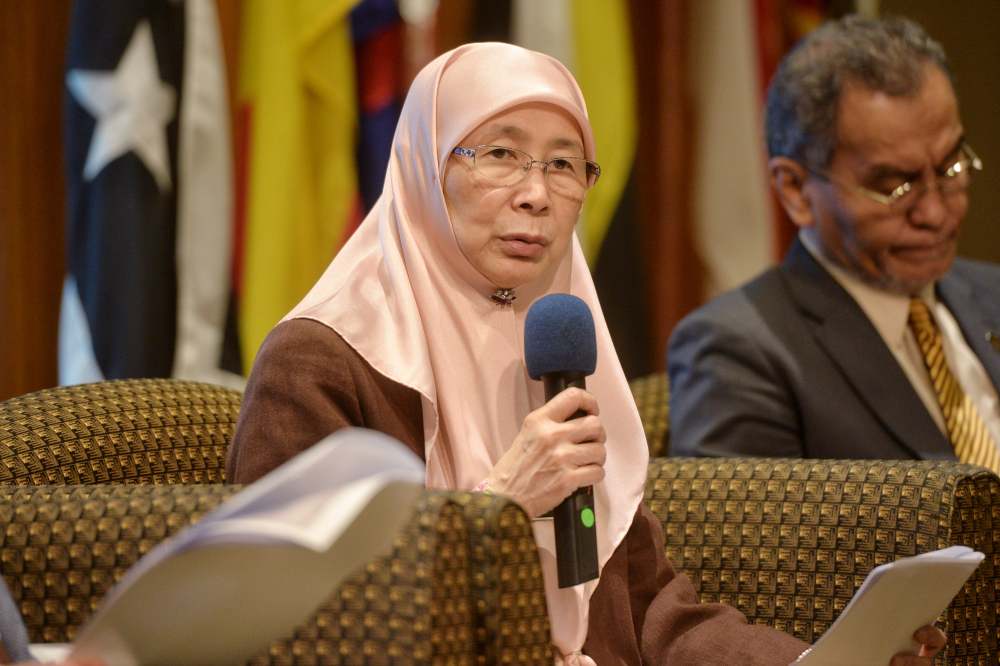PUTRAJAYA, June 25 — The National Cost of Living Action Council (NACCOL) has implemented a “Q-Fish programme” that aims to increase the seafood catch nationwide.
It is also identifying 100 essential products to be sold at all cooperatives at a discounted price.
Besides that, the council is also streamlining all service charges at land transport terminals throughout the country and relooking at the price for the Electronic Train Services (ETS).
Deputy Prime Minister Datuk Seri Dr Wan Azizah Wan Ismail, after chairing the NACCOL meeting at the Prime Minister’s Office here today, told the press that apart from the four matters mentioned above, it had also managed to reduce the price of goods during this year’s Hari Raya festivities which was in line with its Festive Season Maximum Price Control Scheme (SHMMP) programme.
“Based on data collected from 21 May to 19 June 2019 by the Domestic Trade and Consumer Affairs Ministry (KPDNHEP), the price of chicken dropped to RM6.80 from RM7.42 last year, exported beef is at RM20.40 compared to RM24.29 and dry chillies are at RM14.13 compared to RM19.50 last year,” said Dr Wan Azizah.
“These are programmes which were discussed at previous meetings and having seen their results today, we feel they have successfully reduced the cost of living.
“Besides that, we are pushing the Q-Fish programme which is to increase the production of fish from 561 metric tons to 3,500 metric tons per year. This will be done by using the “Individual Quick Freezing (IQF) technique to ensure quality and freshness.
“These matters were approved by the council today.”
Dr Wan Azizah said the NACCOL has also identified the 100 essential items to be placed under price controls and sold at all cooperatives at a discounted price.
She said the 6.1 million cooperative members throughout the country can participate in entrepreneurial, wholesale and plantation activities, send their products to the co-op and by doing so, they can eliminate the middlemen who drive up cost.
“The Essential Goods Programme (BA100) is to help farmers and fishermen to produce and sell their own products to the cooperatives, therefore eliminating or reducing the role that middlemen play in business,” said Wan Azizah.
Items such as rice, sugar, butter, oil, flour and bread are on the list, which was compiled by the ministry after conducting surveys on consumer behaviour.
The Transport Ministry also had both its proposals green lit today.
First was to streamline all goods and services prices at all land terminals throughout the country; and second was to check and amend the price of tickets for the popular Electronic Train Services or ETS.
“We’ve noticed that many public land terminals have different charges and fees for their services and we want to streamline this fee,” said Domestic Trade and Consumer Affairs Minister Datuk Seri Saifuddin Nasution Ismail.
“For example, the charges for ticket booths, toilets and other amenities are reflected in the final ticket price of which the consumer will have to bear. These prices are determined by the owner of these terminals.
“We want to eliminate this or fix the price for the whole country and we will do so by grading them from best to worst. Our concern is that if these terminals improve their services, will they then charge the consumer? This is where we need to get a set of rules in place so the consumer won’t be taken advantage of.”
As for the ETS, the ministry wants to revise ticket prices. Currently, a one-way ticket from Kuala Lumpur Sentral to KLIA is RM55, compared to Singapore that charges S$2 or about RM6.10.
The NACCOL today also welcomed five new members.
They are International Trade and Industry Minister Datuk Darrell Leiking, Attorney General Tommy Thomas, MP for Jeli Datuk Seri Mustapa Mohamad, Malaysia Digital Economy Corporation CEO Surina Shukri and Malaysian Youth Council president Jufitri Joha.
* Editor's note: An earlier version of this article contained an error that has since been rectified.



















